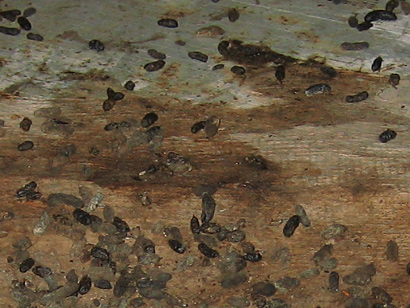- USA Wildlife Removal Education Guide and Resources
Rat Urine

Rat Urine And Grease - Rats have a reputation as dirty and unpleasant animals, and if you ever come into contact with a wild rat, you will often be left with the impression that their reputation is well deserved. Even if you do not actually touch the animal, you will often see the signs where the rat has been rubbing against the walls, or you will see areas where it has been urinating. This is a key indicator that you will have some work to do, even if you have already dealt with the rat problem itself, and while these substances are not as harmful as a rat carcass or feces, it still needs to be treated with care and to be cleaned properly.
Where Are You Likely To Encounter This Contamination?
As a species, rats have developed into a very successful survivor by being able to squeeze and push through almost any hole and find a food source in almost any surroundings, so you can spot grease and rat urine almost anywhere. However, there are areas where you are particularly likely to spot it, and this is around the entry and exit holes and tunnels that the rats use to get in and around a particular area. Rat urine is difficult to spot on most surfaces, but where you see rat droppings you are also likely to find urine too, while if you have a white surface such as insulation, this can show up the yellow of the urine.
What Is Rat Grease?
The thick brown substance that covers much of the rat's body is made up of several substances, but the most important thing to remember is that you will want to avoid any kind of contact with it where possible. This is made up of the dirt, sewage and filth that rats regularly come into contact with during their everyday exploration, and this is then combined with the pheromones and natural byproducts that they expel every day. Because of this pheromone aspect in the grease, it is very important that it is cleaned up quickly and effectively where possible, otherwise it can attract other animals to the area.
Diseases Transmitted By Rat Urine And Grease
In terms of the most likely to transmit disease, the urine of the rat is certainly the most likely to hold different diseases, and one of the most dangerous is Leptospirosis, which causes some horrible symptoms and is usually transmitted through water or food contaminated with rat urine. Hantavirus Pulmonary Syndrome is another condition that needs to be considered, as this can also be transferred by a rat's urine, and although it is rare it can be fatal. Although it may not be as serious, Salmonella can also be contracted from a rat's urine, and causes symptoms such as diarrhea and vomiting, only becoming a serious issue in rare cases.
Cleaning And Repairing Areas Contaminated With Rat Urine
If you are cleaning up an area that has been contaminated by rat urine, make sure you take precautions to prevent you from inhaling and spores or bacteria and to protect your eyes from these particles. Because of the dangers that come with rat urine, if you cannot replace or remove the surface where the urine is present, you will need to wash it with a disinfectant to remove any threat. If you are looking at a surface such as insulation in the attic, it is best to replace it where possible, while fabrics that can be removed and washed should be done on a hot wash, and then sprayed with a disinfectant to kill any remaining bacteria.
Cleaning Rat Grease
This slimy substance is one of the toughest things to get rid of, but it is very important that you do, otherwise the scent of the pheromones will attract other rats. It is best to start by scrubbing the wall or surface with an enzyme cleaner, and then follow up by scrubbing the surface with bleach to kill off any remaining harmful particles. Try to remove as much as possible of the grease, and look for the areas of the wall that aren't immediately visible, but may still have the grease stains present.
Preventing Rats From Returning To Your Home
Once you have dealt with your rat problem and cleaned up all of the grease and urine contamination that is such a problem, making sure you don't get rat problems in the future is very important. Carry out a thorough examination of the attic, cellar or any other space where the rats have caused an issue. Look to seal any holes where the rats have previously been able to get in, and remember that they can squeeze through holes that are as small as a quarter. Keep your property in good maintenance, and make sure you monitor for any damage that might open up your property to these unwelcome visitors.
Go back to the main Rat Removal page for more information about rat pee, and whether or not it can cause diseases. Tips for getting rid of rat urine smell.

